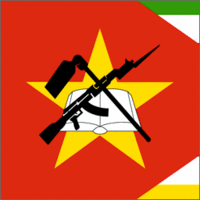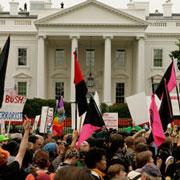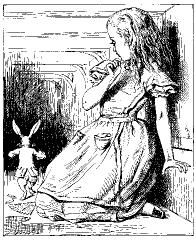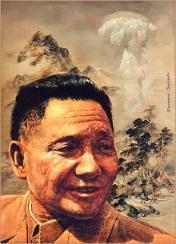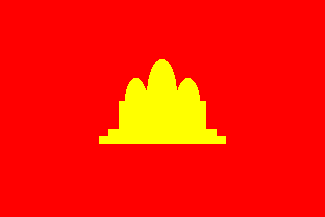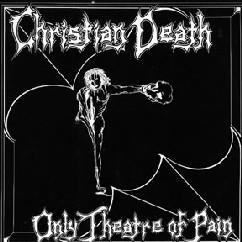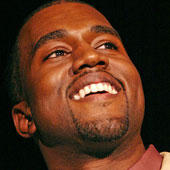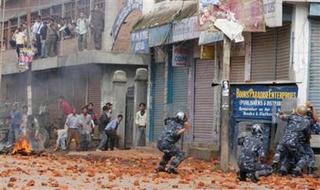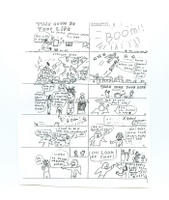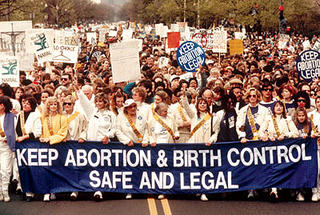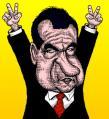
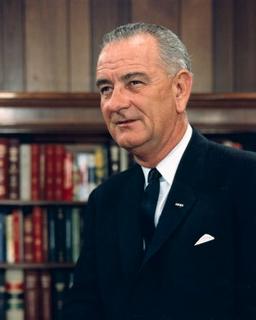
Here are some excerpts from speeches by two presidents trying do deal with a military conflict in Vietnam.
Lyndon Baines JohnsonSpeech at Johns Hopkins University
April 7, 1965
“Tonight Americans and Asians are dying for a world where each people may choose its own path to change.
This is the principle for which our ancestors fought in the valleys of Pennsylvania. It is the principle for which our sons fight tonight in the jungles of Vietnam.”
… The first reality is that North Vietnam has attacked the independent nation of South Vietnam. Its object is total conquest.
(This is an out-right lie. According to
Lonely Planet’s Vietnam
History:
“Pro-independence forces, dominated largely by the leadership of Ho Chi Minh, resisted French domination during and after WWII. Ho Chi Minh's declaration of Vietnamese independence in 1945 sparked violent confrontations with the French, culminating in the French military defeat at Dien Bien Phu in 1954.
The negotiation of the Geneva Accords of 1954 between the Vietnamese and the French temporarily divided the country into two zones (the Communists assumed control of the north and the anti-Communist, US-supported Ngo Dinh Diem took the south). Free elections were to have been held across the country in 1956, but Diem reneged on the plan - Ho Chi Minh seemed likely to win - and instead consolidated his own power in various ways, including fixing a referendum. Western powers embraced his government.”
There never was an independent south.)
Of course, some of the people of South Vietnam are participating in attack on their own government. But trained men and supplies, orders and arms, flow in a constant stream from north to south.”
…. We have helped to build, and we have helped to defend. Thus, over many years, we have made a national pledge to help South Vietnam defend its independence.
(Again, the above history shows South Vietnam’s independence to be a lie.)
And I intend to keep that promise.
… We hope that peace will come swiftly. But that is in the hands of others besides ourselves. And we must be prepared for a long continued conflict. It will require patience as well as bravery, the will to endure as well as the will to resist.
… This generation of the world must choose: destroy or build, kill or aid, hate or understand.
We can do all these things on a scale never dreamed of before.
Well, we will choose life. In so doing we will prevail over the enemies within man, and over the natural enemies of all mankind.”
 Richard M. Nixon
Richard M. NixonNixon's Address to the Nation on the War in Vietnam
"The Silent Majority" Speech
November 3, 1969
“Now, let me begin by describing the situation I found when I was inaugurated on January 20.
--The war had been going on for 4 years.
--31,000 Americans had been killed in action.
--The training program for the South Vietnamese was behind schedule.
--540,000 Americans were in Vietnam with no plans to reduce the number.
--No progress had been made at the negotiations in Paris and the United States had not put forth a comprehensive peace proposal.
--The war was causing deep division at home and criticism from many of our friends as well as our enemies abroad.
… In view of these circumstances there were some who urged that I end the war at once by ordering the immediate withdrawal of all American forces.
From a political standpoint this would have been a popular and easy course to follow. After all, we became involved in the war while my predecessor was in office. I could blame the defeat which would be the result of my action on him and come out as the Peacemaker. Some put it to me quite bluntly: This was the only way to avoid allowing Johnson’s war to become Nixon's war.
But I had a greater obligation than to think only of the years of my administration and of the next election. I had to think of the effect of my decision on the next generation and on the future of peace and freedom in America and in the world.
Let us all understand that the question before us is not whether some Americans are for peace and some Americans are against peace. The question at issue is not whether Johnson's war becomes Nixon's war.
… Fifteen years ago North Vietnam, with the logistical support of Communist China and the Soviet Union, launched a campaign to impose a Communist government on South Vietnam by instigating and supporting a revolution.
(As with President Johnson, this was an out-right lie. See Lonely Planet History above.)
In response to the request of the Government of South Vietnam, President Eisenhower sent economic aid and military equipment to assist the people of South Vietnam in their efforts to prevent a Communist takeover. Seven years ago, President Kennedy sent 16,000 military personnel to Vietnam as combat advisers. Four years ago, President Johnson sent American combat forces to South Vietnam.
… In January I could only conclude that the precipitate withdrawal of American forces from Vietnam would be a disaster not only for South Vietnam but for the United States and for the cause of peace.
For the South Vietnamese, our precipitate withdrawal would inevitably allow the Communists to repeat the massacres which followed their takeover in the North 15 years before.
--They then murdered more than 50,000 people and hundreds of thousands more died in slave labor camps.
--We saw a prelude of what would happen in South Vietnam when the Communists entered the city of Hue last year. During their brief rule there, there was a bloody reign of terror in which 3,000 civilians were clubbed, shot to death, and buried in mass graves.
--With the sudden collapse of our support, these atrocities of Hue would become the nightmare of the entire nation-and particularly for the million and a half Catholic refugees who fled to South Vietnam when the Communists took over in the North.
… At the time we launched our search for peace I recognized we might not succeed in bringing an end to the war through negotiation. I, therefore, put into effect another plan to bring peace-a plan which will bring the war to an end regardless of what happens on the negotiating front.
It is in line with a major shift in U.S. foreign policy which I described in my press conference at Guam on July, 25. Let me briefly explain what has been described as the Nixon Doctrine-a policy which not only will help end the war in Vietnam, but which is an essential element of our program to prevent future Vietnams.
We Americans are a do-it-yourself people. We are an impatient people. Instead of teaching someone else to do a job, we like to do it ourselves. And this trait has been carried over into our foreign policy.
In Korea and again in Vietnam, the United States furnished most of the money, most of the arms, and most of the men to help the people of those countries defend their freedom against Communist aggression.
… My fellow Americans, I am sure you can recognize from what I have said that we really only have two choices open to us if we want to end this war.
--I can order an immediate, precipitate withdrawal of all Americans from Vietnam without regard to the effects of that action.
--Or we can persist in our search for a just peace through a negotiated settlement if possible, or through continued implementation of our plan for Vietnamization if necessary-a plan in which we will withdraw all of our forces from Vietnam on a schedule in accordance with our program, as the South Vietnamese become strong enough to defend their own freedom.
I have chosen this second course.
It is not the easy way.
It is the right way.”
IRAQ and AFGHANISTANAnd today we have the war in both Iraq and Afghanistan. Here are more excerpts:
President George Bush hasn’t made that many speeches, but those he makes already sound similar
to those above:
“We also must never forget the most vivid events of recent history. On September the 11th, 2001, America felt its vulnerability -- even to threats that gather on the other side of the earth. We resolved then, and we are resolved today, to confront every threat, from any source, that could bring sudden terror and suffering to America. “
Right before he started the war
Bush said of Saddam Hussein:
"He is a danger not only to countries in the region but, as I explained last night, because of his al Qaeda connections, because of his history, he is a danger to Americans," Bush said, referring to Tuesday's State of the Union address. "And we're going to deal with him. We're going to deal with him before it's too late."
And as in Vietnam, the war was initiated on a lie.
Recently Bush stuck to his theme that this is a war on “terrorism.”
According to
The Wichita Eagle’s Phillip Brownlee:
“But President Bush made clear that he is sticking with "war on terror," using the phrase five times during a speech Wednesday, the
New York Times reported. Of course, this is mostly a PR debate, and whether it’s called a war or a struggle doesn’t change the challenge that we face.”
Many of his supporters are making the same arguments made in the 1960s and 1970s about Vietnam, that we should “stay the course” until some type of victory.
Now lets look at
Jonathan Gurwitz, of the
San Antonio Express-News, 07/27/2005 who writes:
“Supporters of the wars in Iraq and Afghanistan repeat the erroneous assumption that those conflicts have nothing to do with terrorist violence because they mistakenly believe its verity somehow bolsters opponents of those wars. Nothing could be further from the truth.
The fatal conceit of those who see more violence as a sign of a failed policy is that the previous policy — doing nothing or, worse, appeasing terrorism — gave us a smoking Pentagon, a hellish void in Lower Manhattan and a cratered field in Pennsylvania. The vast majority of American deaths in a war on terror that is now approaching its fourth year still occurred on a single day in 2001.
Columnist Gerard Barker wrote recently in the
Times of London:
"Yes, our engagement in Iraq has increased the risk that we will be attacked, but that fact in no way instructs us to get out of Iraq or the Middle East. On the contrary it makes it more urgent than ever that we win there. The right way to tackle that view is not to indulge it, sympathize with it or nurse it, but to correct it. The right way to deal with anti-American and anti-British sentiment in the Muslim world is not to pull out our troops from Iraq and beg forgiveness, but to continue to fight there on behalf of the majority of good Muslims for the kind of country they need and deserve."
The war in Iraq has everything to do with the war on terror in the United States and Britain and everywhere in the world. It is, in fact, now the primary battlefield on which that war is being fought. Like the residents of Popper's imaginary village, we ignore that reality at our own peril.”
Exchange the words “communism” for “terrorism” and you find about the same arguments. We slog on loosing the lives of our young with some misguided belief in our god-like abilities to create nations in our own image and likeness. This is called imperialism. It has never worked and never will.
We will loose again, as surely as we lost the first time. The enemy is different, but the conflict is the same.
THOSE WHO DO NOT LEARN FROM HISTORIES MISTAKES ARE DOOMED TO REPEAT THEM!

 Original flag of Mozambique independence
Original flag of Mozambique independence 

